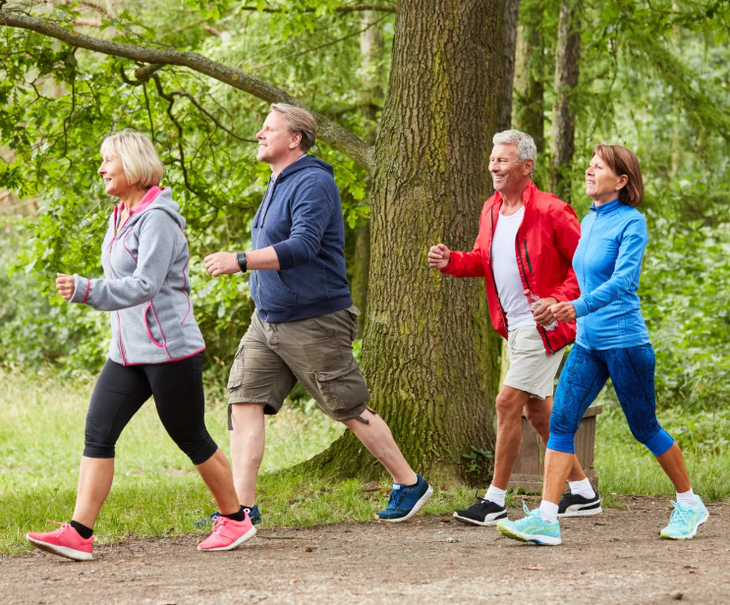
Walking with a clear goal, continuously for a long enough period of time can be the "key" to long-term health, especially for people who are sedentary - Photo: AI
For years, the advice to "walk 10,000 steps a day" has become almost synonymous with a healthy lifestyle. But new research published in the Annals of Internal Medicine has caused many to reconsider.
According to a team of authors led by Dr. Borja del Pozo Cruz (University of Southern Denmark), the way we walk, whether intermittently or continuously, strongly affects the risk of death and cardiovascular disease, especially in people who walk less than 8,000 steps per day.
The team followed 33,560 adults in the UK as part of the UK Biobank national health project. They were divided into four groups, based on the average duration of each “walking bout”: Less than 5 minutes; 5-10 minutes; 10-15 minutes; and 15 minutes or more.
On average, participants took only about 5,165 steps per day, which is significantly less than recommended. However, the difference was in how they accumulated those steps.
The results showed that people who regularly walked continuously for 10-15 minutes at a time had a much lower risk of death than the group that only walked short distances.
Specifically, in nearly 10 years of follow-up, the risk of death in the group walking less than 5 minutes was 4.36%, while in the group walking more than 15 minutes, this number was only 0.8%, a decrease of more than 5 times.

No need for too much, just regular and targeted to effectively protect the heart - Photo: AI
It is worth noting that the cardiovascular protective effect is equally pronounced.
People who mainly walked for short walks of less than 5 minutes had a 13% risk of cardiovascular disease (CVD), while those who walked for at least 15 minutes each time had a 4.4% risk. A similar trend was seen in those who were the least active, with less than 5,000 steps per day.
According to experts, walking continuously for a long enough period of time helps the body reach a threshold of beneficial activity: heart rate increases steadily, blood circulation improves, and metabolism is stimulated more effectively. Conversely, moving only intermittently, scattered throughout the day is often not strong enough to create positive physiological changes.
“Intentional steps, maintained at a pace of 10-15 minutes, get the heart and blood vessels ‘in gear,’ creating a much better biological effect than sporadic steps,” explains Dr. Pozo Cruz.
Interestingly, this study does not advocate forcing yourself to walk a lot, but rather encourages each person to maintain regular walking sessions with a clear goal.
Walking is one of the easiest and least risky forms of exercise, no gym, no equipment, just a good pair of shoes and 15 minutes a day. But how you walk is what matters.
Experts advise that if you are a sedentary person, start by walking continuously for 10 minutes at a time, then gradually increase to 15-20 minutes. The ideal time is early morning or after dinner, when the air is pleasant and the biological rhythm is stable.
Maintaining regular walking sessions, even just a few thousand steps, helps the body form a habit of conscious movement, improves circulation, controls blood sugar and reduces the risk of visceral fat accumulation.
Health experts suggest that “walking with purpose” is not only a physical activity, but also a form of mindfulness. When you focus on each step, breath and heart rate, the brain is relaxed, helping to reduce stress and improve mood.
This is especially important in an age where people are increasingly busy and sedentary. Just one really focused walk a day can both exercise the body and relieve stress, a "two in one" for both physical and mental health.
This study adds to the growing evidence that walking properly may be the best "medicine" anyone can use.
Get off the screen, get some real exercise
Instead of obsessing over the 10,000 steps number, what matters is the quality of the steps. Take time to step away from the screen and let your feet really move.
A short 15-minute walk, if done with concentration and at a steady pace, can make your heart stronger, your mind clearer, and your life much easier.
As Dr. Pozo Cruz concludes, “Sometimes the secret to longevity is not how far you go, but how you go.”
MINH HAI
Source: https://tuoitre.vn/khong-phai-ai-di-nhieu-cung-khoe-di-the-nao-moi-tot-20251103115346135.htm







![[Photo] Opening of the 14th Conference of the 13th Party Central Committee](https://vphoto.vietnam.vn/thumb/1200x675/vietnam/resource/IMAGE/2025/11/05/1762310995216_a5-bnd-5742-5255-jpg.webp)




























![[Photo] Panorama of the Patriotic Emulation Congress of Nhan Dan Newspaper for the period 2025-2030](https://vphoto.vietnam.vn/thumb/1200x675/vietnam/resource/IMAGE/2025/11/04/1762252775462_ndo_br_dhthiduayeuncbaond-6125-jpg.webp)












































































Comment (0)